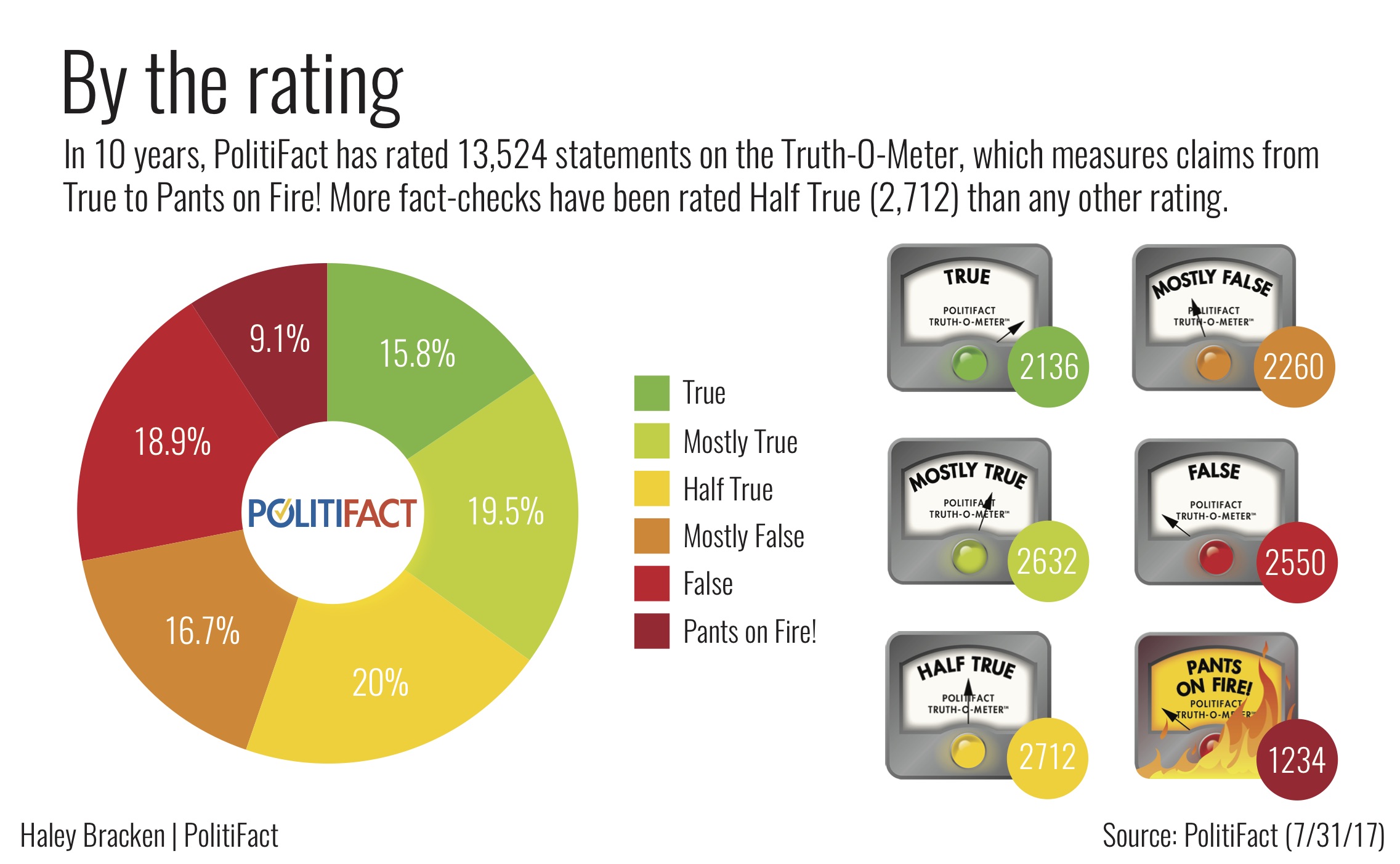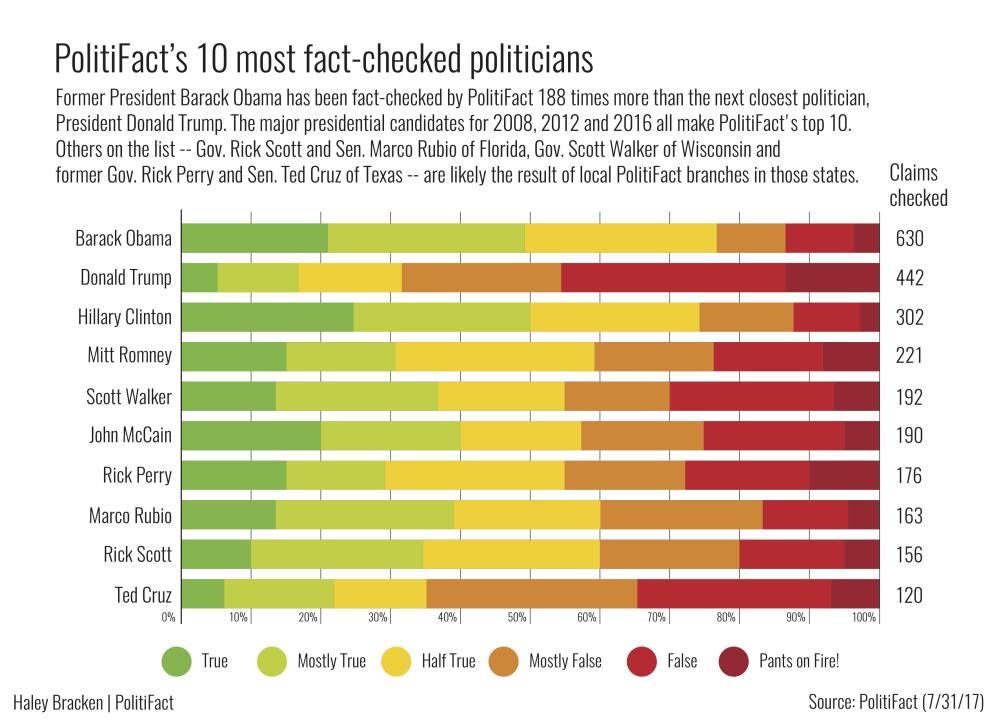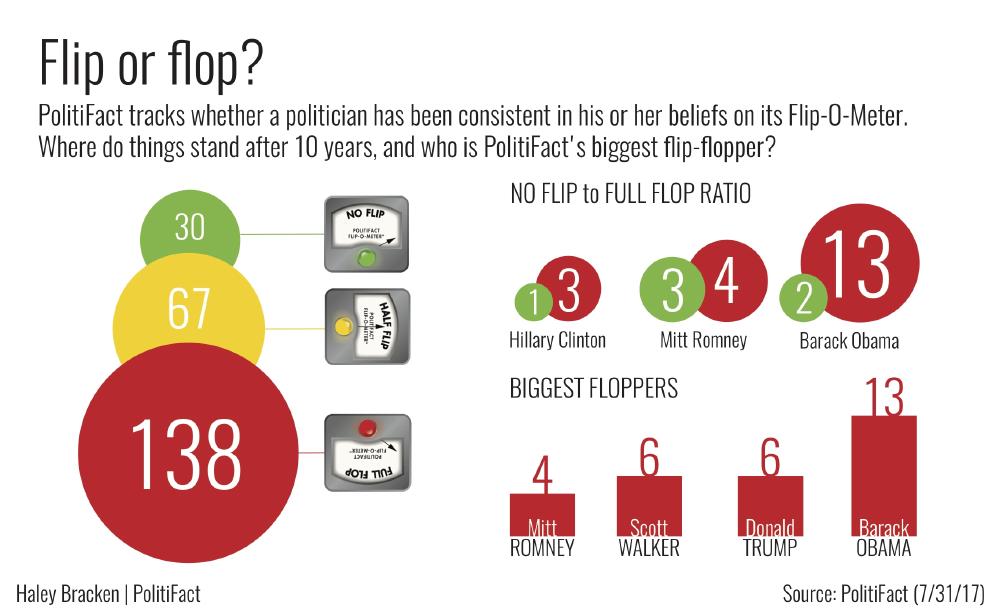Stand up for the facts!
Our only agenda is to publish the truth so you can be an informed participant in democracy.
We need your help.
I would like to contribute
In honor of PolitiFact's anniversary this month, Editor Angie Drobnic Holan writes a note to readers on how fact-checking has changed.
Ten years ago, I was a reporter assigned to a new fact-checking website no one had heard of. "Politi-What?" press secretaries would say when I called. "Politi-FACT," I would say. Then I’d have to spell it.
Today, I almost never have to spell our name, and the press secretaries know exactly why we’re calling. Even the politicians do. They don’t want to get PolitiFact-ed, they say. They’re phrasing their comments more carefully, and having aides scrutinize speeches to eliminate mistakes. (Most are, anyway.)
KEEP POLITIFACT GOING FOR ANOTHER 10 YEARS. JOIN THE TRUTH SQUAD.
Having name recognition and a track record makes fact-checking much different than the early days. As editor of PolitiFact, I supervise a team of eight fact-checkers who research, report and write fact-checks. When I look back at the past 10 years, it seems like fact-checking has gotten both easier and harder.
And the ways it has changed say a lot about technology, politics and society as a whole.
What makes it easier?
More and more information is moving to the Internet, making fact-finding easier than ever. Data is at the fingertips of fact-checkers and the public.
We also have made big strides in improving methodology, the system we use for researching, writing and editing thousands of fact-checks, more than 13,000 and counting at PolitiFact.com.
Through sheer repetition, we’ve developed principles and checklists for fact-checking. PolitiFact’s Principles of the Truth-O-Meter describes in detail our approach to ensuring fairness and thoroughness. Our checklist includes contacting the person we’re fact-checking, searching fact-check archives, doing Google and database searches, consulting experts and authors, and then asking ourselves one more time what we’re missing.
Our ratings system is more rigorous as well. In the early days, we’d decide ratings — be it True, Mostly True, Half True, Mostly False, False or Pants on Fire — by casually asking ourselves whether it "felt" like one rating or the other, as a quick gut-check.
After criticism that some of our ratings seemed arbitrary, we created official definitions to guide us. Half True, for example, means the statement is partially accurate but leaves out important details or takes things out of context. Pants on Fire means the statement is not accurate and makes a ridiculous claim.
Today, three editors decide ratings on each fact-check by formally asking and answering four questions: Is the statement literally true? Is there another way to interpret it? What was the speaker’s evidence? And how have we rated similar claims in the past? When we’re not sure what to rate a statement, those questions and our definitions help us decide with confidence.
Fact-checking methodology like this is spreading around the world. The International Fact-Checking Network, an association of fact-checkers, released a code of principles in 2016 to be adopted by any fact-checking organization around the world.
The code asks for a commitment to five core principles: nonpartisanship and fairness; transparency of sources; transparency of funding and organization; transparency of methodology; and open and honest corrections.
At PolitiFact, we are firmly committed to those principles. Being part of the International Fact-Checking Network challenges and encourages us to show our readers how we’re living out those principles in our day-to-day journalism.
All of those things — more widespread awareness of fact-checking, more online data and improved methodology — have made fact-checking easier over the years.
What makes it harder?
It will shock no one to hear that the political discourse we monitor at PolitiFact has become angrier and more polarized. It didn’t always have this negative intensity. When we got started in 2007, Barack Obama and John McCain didn’t agree on much, but by today’s standards they were positively cordial. McCain called Obama "a decent person and a person that you do not have to be scared of as president." Obama chastised his own supporters for criticizing McCain’s military service, a sentiment repeated by Obama’s press secretary when candidate Donald Trump criticized McCain in 2015.
President Trump is not like other politicians. He revels in insulting opponents, and his harsh attacks are at odds with the rules of civility. He tends to speak off the cuff, exaggerating to make a point. We fact-check Trump regularly, and over time we’ve found that roughly 70 percent of the things we’ve chosen to fact-check have significant accuracy problems. He says things over and over that are not accurate, and he doesn’t seem to put much effort into correcting himself.
Every week, I write an email to PolitiFact readers who have signed up to hear what we’re covering. Recently, when I pointed out some of the things the president got wrong, a reader emailed me back: "Please remove my email address from PolitiFact, a fake news service written by intellectuals yet idiots, who haven’t a clue about real life (and are) trying to destroy the American way. Holan, you should be ashamed." (This was relatively mild criticism.)
It always depresses me a little to get emails that don’t engage our fact-checks or say why we’re wrong or what we misunderstood.
Today, both sides seem to have an abiding hatred that is much more intense. Monitoring such a toxic discourse is wearying. And I think it’s wearying for everyone: the public, the media, even some of the politicians themselves.
It is not easy to tease out all the causes of increasing negative partisanship. Inequality, economic isolation, cultural divisions, racial divisions, philosophical differences and an increasingly partisan media likely all play a part.
Yet I sympathize with that reader who emailed me, because I think he feels lied to. I’m not lying to him, though, and I hope he takes a minute to look again at our reports, to read them with an open mind and to look at our source documentation. I realize he probably won’t look, but maybe another reader will.
It’s that hope that sustains PolitiFact’s commitment to thorough reporting, transparency of evidence, and a rational and reasoned discourse. The true enemy of democracy is cynicism and apathy, when we throw up our hands and say we can’t agree on anything, so nothing matters.
Politics is a tough world right now, but fact-checking is still well worth doing. There is a tremendous power in the simple assertion of what is true.
At PolitiFact, we’ll keep on asserting the truth, and our readership remains those who want to hear it.
To support PolitiFact's mission, join the Truth Squad. Angie Drobnic Holan is the editor of PolitiFact. Contact her at [email protected]. Follow @AngieHolan.
Our Sources
PolitiFact


















































